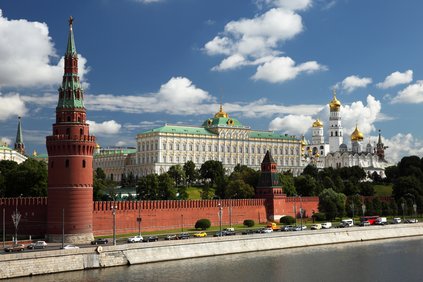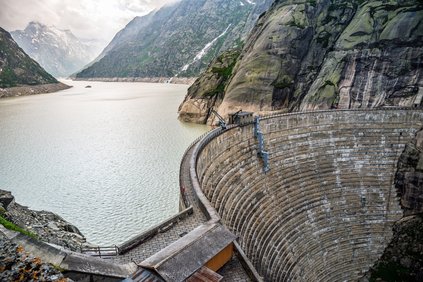Opinions - 11.03.2022 - 00:00
Ways out of the war in Ukraine?
After more than two weeks, there is no end in sight to Russia's aggression in Ukraine. Continued or even escalated fighting could lead to a humanitarian catastrophe. Meanwhile a solution can only be reached, if all sides make concessions. By Andreas Böhm.

11 March 2022. With the invasion of Ukraine, Russian President Putin has also declared war on the European order. Initially, resistance to this was largely exhausted in symbolic politics, such as the lighting of the Brandenburg Gate in the Ukrainian national colours, the posting of well-favoured tweets or the suspended certification of Nord Stream II, which is not going into operation for a long time anyway. NATO countries do not want to use military means in Ukraine, lest they spark a nuclear conflict.
Offer ways out of sanctions
The first reaction to the aggression were sanctions, which are only be effective, if they are used as a building block of a comprehensive strategy. In order to avoid their consequences, the affected state is to be pushed in a certain direction or toward a specific action. Thus, in addition to the proverbial stick, the carrot of a desirable way out must also be offered. This is how the negotiations on the nuclear agreement with Iran (JCPOA) got off the ground.
However, sanctions are hardly embedded in a strategy. Most of the time, they are enacted to sanction behavior that is disapproved of without being able to do anything about it. If the costs are kept within reasonable limits, this is symbolic policy. It’s a mere exhibition of attitude without real consequences. This includes, for example, the sanctions after Russia occupied Crimea. They had no thrust of any kind. Russia was able to easily substitute the resulting welfare losses.
Sanctions against unpopular regimes are usually counterproductive
If sanctions are not directed against a specific measure, but against an unpopular regime at large, they are tougher. Pressure is exerted to harm the regime and stir up discontent among the population, with the vague hope that they will turn against the rulers. From a strategic point of view, such sanctions are usually useless or even counterproductive. As a rule, they only result in catastrophic humanitarian conditions without significantly affecting the position of the country's political and economic elites. On the contrary, they succeed in expanding their power because they control the illegal channels through which the sanctions are circumvented. Previously independent actors are driven into the arms of the regime when trade channels are closed. Examples would include Iran under Trump, Cuba, Syria, and Venezuela.
Even after Russia's invasion of Ukraine, there was initially no willingness to take on really tough measures - because Europe itself would be affected. After all, sanctions are a double-edged sword. Germany, for example, did not want to do without Russian gas for the time being, Italy continued to export luxury goods, and Belgium diamonds. Austria sees its banks exposed, Switzerland the commodity trade in Zug. The list could be continued. It took some time until common action could be agreed upon.
Sanctions against the Russian Central Bank
The sanctions against the Central Bank of the Russian Federation are a notable move, targeting Russia's foreign exchange reserves. These are estimated at up to $630 billion and, in Putin's own words, are the guarantee of Russian sovereignty. To a large extent, these are deposits with the IMF, the BIS and other central banks, especially the Eurosystem. If access to the foreign exchange reserves is made more difficult or even withdrawn, Putin's strategy of using them to finance his war will be thwarted. Nor could the losses be substituted by gold reserves or deposits with the National Bank of China.
The consequences were quickly visible: a massive devaluation of the ruble and a storm on the banks. The central bank is now trying to prevent a negative spiral that would drag down the financial sector as a whole. In addition, Russian companies can no longer use foreign currency to import production goods, which will sooner or later cripple the economy. For air transport, this is already foreseeable and catastrophic for a country the size of Russia.
Evaluating these sanctions depends on the intended effect. First of all, it is to be welcomed that the West has taken a firm stand against Putin's aggression, as the latter was hoping to play on previous differences. This calculation did not work out. But even this massive step, sometimes described as a financial nuclear bomb, is not unproblematic from a strategic perspective, since it would have to be flanked by a diplomatic initiative. At present, the impression is growing that this is primarily a punitive action.
The likelihood of getting Putin to relent through mass protests is low. Moreover, analyses have shown that dictators hardly react to pressure from the population. Real and digital repressive measures are simply too strong. Power needs to be attacked with counter-power, be it military or financial. Autocrats are much more likely to respond to pressure from the military or economic elites than to the streets. Even the Egyptian dictator Mubarak was not overthrown because of the opposition in Tahrir Square, but because the army let him fall.
Use the fault lines within the elites of Russia
So what could be done? Fault lines should be uncovered and exploited within Russia's economic and political elites. These have sworn unconditional loyalty to Putin. It is based on redistribution from the bottom to the top by rewarding the elite with lucrative, i.e. massively overpriced, state contracts: a classic kleptocracy. But would they maintain this loyalty even if they suffered severe wealth losses as a result?
Regardless of its desirability, overthrowing Putin is currently unrealistic. The political and military structures are too strongly aligned with him. As he can only feel secure in power, he will defend it no matter what the cost. Possibly even if he realizes that he is not only dragging his opponent into the abyss, but his own country as well. Statements to this effect have been documented, which is why the threat of nuclear deterrence must be taken seriously.
On the other hand, a strategic approach is not aimed at pushing Putin into a corner, but at opening up ways to reverse the spiral of conflict. Even if the screws are turned even tighter with sanctions in the energy sector and if the consequences of the sanctions for the Russian economy soon come to light, the hour of diplomacy has come. Putin would have to be shown a way out that would allow him to save face, even if there is little indication at present that he would go for it.
Such an approach is highly unsatisfactory from a normative perspective, similar to the outcome of the first Gulf War in 1990, when George Bush refrained from toppling a warmonger and mass murderer like Saddam Hussein. It goes against a basic sense of justice not to hold Putin accountable. But justice and political prudence, the desirable and the feasible, fall apart here. Backing Putin into a corner will only increase the likelihood of further escalation.
The longer the war continues, the further Russian forces advance, and the stronger the impact of sanctions, the higher the hurdles of a diplomatic way out become. At the same time, the number of casualties and the danger of nuclear escalation increase.
Putin's leadership has been damaged
If Putin accepts a way out, it will not automatically cement his power. His miscalculations have become obvious. He neither succeeded in dividing the West nor in capturing Ukraine quickly and efficiently. His leadership has been damaged.
Above all, the relationship with China is tarnished. Although President Xi Jinping demonstratively sides with Putin, he has China's national interests in mind above all. The violation of Ukraine's territorial integrity cannot be reconciled with these. Economically, China is interested in integration in the world market, the advantages of which cannot be substituted by cheap raw materials from Russia. It is no coincidence, that this difference in interests has been highlighted by advisors close to the Chinese leadership in recent days. It should be harnessed diplomatically with a view to a negotiated settlement.
Whatever the details of a diplomatic solution look like, presumably neither side will be particularly happy with it. For the time being, Europe will have to live with Putin and deter him massively and at great cost. Putin has deprived himself of rebuilding a Russian empire and Ukraine will have to be rebuilt with a lot of money, but will hardly be incorporated into the West. The price, however, of having prevented further casualties and a nuclear confrontation would be worth even such a less than satisfactory solution.
Dr. Andreas Böhm is director of the Center for Philanthropy at the University of St.Gallen and lecturer in the Master of International Law.
More articles from the same category
This could also be of interest to you
Discover our special topics
















